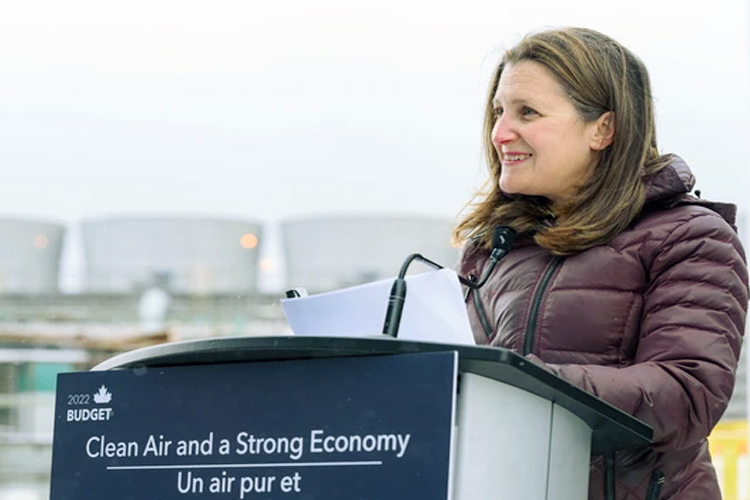 |
| On April 14, 2022, Deputy Prime Minister Chrystia Freeland speaks at a media event at the Alberta Carbon Conversion Technology Centre in Calgary. Image Credit: AZIN GHAFFARI/POSTMEDIA |
According to Freeland, the multibillion-dollar tax credit is essential to make investments in costly carbon capture projects.
Finance Minister Chrystia Freeland is positive that her government's new carbon capture tax credit will entice large-scale investment in the technology in Canada. When the credit was announced, she said, potential investors reacted almost immediately.
"Within 24 hours of the federal budget being tabled, I was hearing from large global investors, individuals I know from my days at the Financial Times, who said, 'we read your budget, we want to learn more,'" Freeland said at a news conference in Calgary on April 14.
"Therefore, there is money to be drawn in."
Freeland was in her home province of Alberta to push new policies aimed at boosting investment in carbon capture, utilization, and storage (CCUS) technology and to sell the Liberals' 2022 budget. Along with corporate executives and provincial authorities, the deputy prime minister toured a carbon capture research and development center in Calgary.
The refundable CCUS investment tax credit will cover half of the cost of carbon dioxide capture equipment and 37.5 percent of the capital costs for CO2 emissions transportation, storage, and use — a potentially huge help to heavy-emitting industries like oil and gas, which are under increasing pressure to reduce greenhouse gas emissions.
A 60-percent credit for investment in direct-air capture devices to remove carbon from the environment was also included in the federal budget.
In its ambitions to reduce emissions over the next eight years, Justin Trudeau's administration has been chastised for depending too heavily on carbon capture technology. Opponents argue that the technology is unproven and could fail to meet Canada's aim of reducing emissions by 40 to 45 percent below 2005 levels by 2030.
The Liberal government, on the other hand, has sided with energy experts, such as the International Energy Agency (IEA), who claim that CCUS technology will be required worldwide if industrial countries are to fulfill their net-zero emissions targets.
According to Freeland, the multibillion-dollar tax credit is critical to attracting investment in large-scale carbon capture projects.
"New stage technology is risky," said Freeland. "I believe that at this point when these new technologies are being developed, we need governments to step in and provide that little push to provide that de-risking, to get these technologies adopted at scale quickly."
"We have to do that because we need to reduce our emissions." And, to be honest, we need to do so if I am to gain a competitive advantage for Alberta and Canada."
Susannah Pierce, president and country chair of Shell Canada, agreed that the tax credit will benefit the industry while touring the Alberta Carbon Conversion Technology Centre with Freeland.
In an interview, Pierce said, "When you look at things like the investment tax credit, those are upfront incentives to really make you feel more comfortable that these projects can be economically viable."
Once operational, Shell's proposed Atlas sequestration hub east of Edmonton could capture up to 10 million tonnes of CO2 per year, according to Pierce.









0 Comments
please do not enter any spam link in the comment box